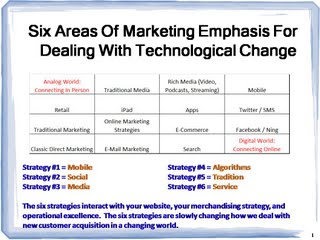Six Marketing Strategies
 In so many ways, it is 1996 all over again.
In so many ways, it is 1996 all over again.I worked at Eddie Bauer in 1996. On a good day, our e-commerce site generated somewhere in the neighborhood of six or seven orders a day. A lot of catalog folks didn't think much of the e-commerce division back then. Here these 25 year-olds were generating orders that were obviously cannibalizing the catalog division, and they were getting credit for them.
Look where we are now. Good thing folks pursued the investment in technology. Except for the fact that investment largely stopped in the early 2000s. Now, we all have the same websites with the same broadly-accepted best practices that all yield homogenized purchase experiences that have resulted in declining online retention rates. On the other end of the spectrum are the mobile and social folks, with their goofy acceptance of honest conversations that create sales that nobody can measure.
Here we go again.
Technology is causing customers to spread out on a grid that is bounded by the analog world, classic direct marketing, the digital world, and the mobile world.
In-between these worlds are environments that can accept traffic, or push traffic to each world.
In 1995, all of our customers resided on the far left side of this grid. In 2010, customers are scattering all across this grid.
So, if we want to grow, we have to scatter with our audience.
This is not the traditional "multichannel" argument that you've heard so much about. No, instead, it is all about having marketing strategies that "cover the grid", if you will.
And we cover the grid via six different marketing strategies.
- Mobile.
- Social.
- Media.
- Algorithms.
- Tradition.
- Service.
Most of the time, we focus our efforts on tactics within each strategy. We create a company blog, and believe we're participating in Social. We create an app for the iPhone, and we believe we are participating in Mobile. We complete an SEO project and believe we're participating with the Algorithms. We send a catalog, and feel like we're producing Media. We offer live chat, and believe we're offering great Service.
We'll use these tactics in the short term to market to existing customers.
Most important, especially for the old-school catalog brands who market to customers under the age of 50, is the concept of using these tools to create Awareness. For customers under the age of 50, it is no longer good enough to rent names and mail catalogs ... just look at your response rates, after matching-back online orders, during the past ten years. The data speaks for itself. You know the trends are not sustainable.
So you're going to have to have a broad-based strategy to create brand awareness, to stand out from a thousand competitors who all sell the same merchandise you sell at the same price (or cheaper) at cheaper shipping rates with faster delivery. You'll have no choice but to craft a strategy that doesn't yet exist, one that fuses Mobile, Social, Media (Rich & Traditional), Algorithms, Tradition, and Service.
You see the embryonic stages of this transition today --- Zappos is a great example of fusing Social and Algorithms and Service.
Now it is your turn. What are you going to do to fuse Mobile, Social, Media (Rich & Traditional), Algorithms, Tradition, and Service?
Oh, sure, I can hear the complaints now.
- "You obviously don't know anything about cataloging. 80% of our transactions come from the catalog. The catalog is the future, it will do better once the economy rebounds."
- "None of that Social stuff works, we tried a blog and it didn't work. We published discounts and promotions on Twitter and only have 339 followers. It simply doesn't work."
- "Why craft a mobile strategy when there isn't a critical mass within one carrier and one phone vendor? And heck, I don't even get coverage at my home, so mobile is nothing more than hype!"
- "The iPad is a farce, it doesn't utilize accepted software best practices. And why would I hold a tablet-based computer when I already own a laptop."
Why not step out of tactics and campaigns, and put on your leadership cap? Why not chart a course to the future? Why not be willing to be wrong? Why not earn your salary by inventing the future, by truly being strategic? Why not step away from pointless tactics and campaigns that only goose demand for a two-week period of time, and instead focus on being brilliant?
Thoughts?
Labels: Six Marketing Strategies
0 Comments:
Post a Comment
Links to this post:
Create a Link
<< Home